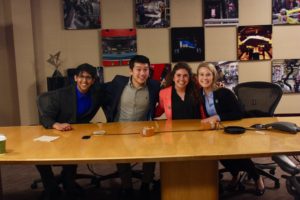To do business, you better get positive
June 13, 2017
By: Magnify Immersion Program students Kenna Boyd, Christina Gatti, Abhi Sastry, and Kevin Yu

How one organization used Positive Organizational Scholarship to fuel their triple bottom line
There is an age-old conflict within business stemming from the assumption that corporations must choose between turning a profit and making a positive impact on their employees and the communities where they are embedded. This conflict is woven into the fabric of capitalism and can breed toxic work environments. But the science of Positive Organizational Scholarship (POS) conveys a positive future through social science dedicated to elevating individuals’ potential in order to enrich organizations–in more ways than just profit. Today, the need for POS is increasingly urgent, and we believe this science has the power to change how our generation conducts business. After all, as part of the millennial wave, we should know.
As a team of students from the University of Michigan, we participated in an undergraduate program in POS — the Magnify Immersion Program within the Stephen M. Ross School of Business. Over a six week period, we studied POS while engaging in hands-on action learning. We partnered with organizations to identify untapped resources that fuel positive capabilities. Our partner organization, Cascade Engineering, a plastic engineering and manufacturing company and member of the CPO Positive Organizations Consortium, exemplifies POS concepts by managing their triple bottom line of people, planet, and profit. Comprised of nine family companies and partnering with a multitude of Fortune 100 companies, there is no doubt that Cascade has significant influence on a local and global level. They are living proof that large corporations can make an impact and profit at the same time.
After our week, one value we saw embedded in Cascade is empowerment. A universal goal for leadership was that every employee at the company feel empowered. While we loved to hear that from management, we saw that goal achieved on the manufacturing plant floor. In Cascade’s plant on 33rd St., employees are part of what are known as Natural Work Teams. These teams are self-directed, allowing employees the autonomy to determine their own scheduling and job tasks. Along with the unique structure of these teams, the plant’s manager, Troy Andrews, crafted a unique job title, stating “We use ‘industrial professional’ because I’m going to treat you like a professional.” According to Andrews, part of empowerment is “understanding you’re a value to the organization,” and we envision a future workforce where every employee feels valued and motivated to drive change.
While not all businesses trust employees to responsibly craft their jobs, Andrews believes the years spent refining this system were worth the effort. But Cascade’s values do not stop there! Cascade encourages employees to make an impact through sustainability. Zero waste from manufacturing plants goes to landfill, and they have innovated processes that reduce waste emissions. As climate change grows more threatening, Cascade’s deep commitment to environmental sustainability is imperative to a cleaner future.
Cascade Engineering’s triple bottom line is based on the idea that if the company cares for people and the planet, not only is profit possible, but maximized. While it is commonly believed that corporations cannot feasibly achieve all three, Cascade’s utilization of Positive Organizational Scholarship demonstrates otherwise. Cascade President and CEO Mark Miller puts it this way: “I didn’t realize a business could keep score beyond just the profit metrics… It took me a while to understand, but now… I’m convinced it’s the future of capitalism.” So as corporations reach a crossroads, we have seen how leaders can face the choice to join the future or remain stuck in the past.
This post was written for the Huffington Post’s Great Work Cultures initiative.
